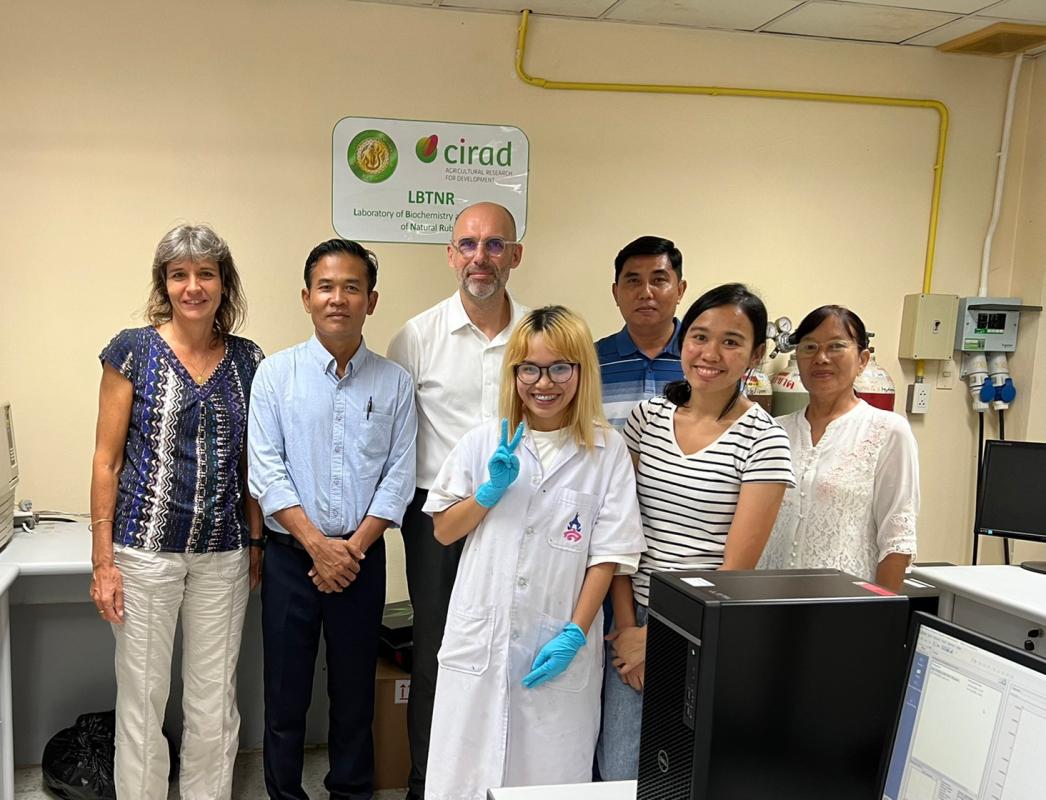- Home
- Worldwide
- Our regional offices
- Continental Southeast Asia
- News : Continental Southeast Asia
- Rubber farming in South East Asia
Rubber farming in South East Asia: on-going regionalisation of the research platform

In Cambodia
Transfer of the lipid extraction protocol to the Cambodian Rubber Research Institute (CRRI) by a joint Kasetsart University-Cirad mission.
In the framework of Chaisiri Kitpaosong's PhD, which includes a 5-week stay in Cambodia at the CRRI station, a one-week joint Kasetsart University-Cirad mission was organised to install the necessary equipment and transfer skills on lipid extraction from latex. Siriluck Liengprayoon (Kasetsart University - KAPI) and Laurent Vaysse (CIRAD-BioWooEB) went to Cambodia from 26 to 30 September 2022 to transfer the latex lipid extraction protocols, as well as the TSC (Total Solid Content) and DRC (Dry Rubber Content) measurements that have been used for many years in the LBTNR KU-CIRAD laboratory at Kasetsart University. They were accompanied by Tucksin Lerksamran (junior researcher from KU) and Chaisiri Kitpaosong (PhD student from UM-KU working on furanic acid production from rubber latex). They were welcomed by Lim Khan Tiva, Director of CRRI, and Kim Chandy, Head of the National Natural Rubber Specification Laboratory located at the CRRI research station near Kampong Cham. Ngourn Layin, head of the research station and Phen Phearun, agronomy manager, and all their teams were very supportive. This mission was jointly funded by SEARCA, Agropolis International and CIRAD (PhD from Chaisiri). Chaisiri and Tucksin stayed at the CRRI station for an additional 4 weeks to perform extractions and analyses on the latex of 52 genotypes.
In Thailand with a delegation from Myanmar.
In the framework of the GRO project (Generating Rubber Opportunities in Myanmar), a training session for a delegation of Burmese colleagues was organised in Thailand within the HRPP platform.
The joint KU-CIRAD laboratory of biochemistry and technology of natural rubber (LBTNR) hosted the delegation for a methodological training on the implementation of experimental protocols on latex stability during post-harvest transportation. A field pratical session took place in the province of Chachoengsao on the plantation of Pisamai Chantuma (former researcher of the Rubber Authority of Thailand, RAoT) who gave an excellent welcome to the whole team. The delegation was composed of 2 colleagues from the GRO project (Mr. Tun Thein and Mr. Aung Thar Shein) and an expert (Ms. Khin Myo Swe) working with the GRO project. The objective of this training was to enable the subsequent implementation of this experimentation in Myanmar despite the political situation which prevents the intervention of foreign experts in the project's fields. This mission was organised by Bénédicte Chambon (CIRAD, researcher and co-facilitator of the GRO project), and led by Siriluck Liengprayoon (KU, Head of the LBTNR laboratory) and Laurent Vaysse (CIRAD, researcher).
The GRO project is a development project funded by the Swiss Cooperation (SDC) and operated by CARE International in Myanmar. CIRAD has been involved as a project partner since 2017 and a co-facilitator since 2019.
More about the GRO project in Myanmar
























